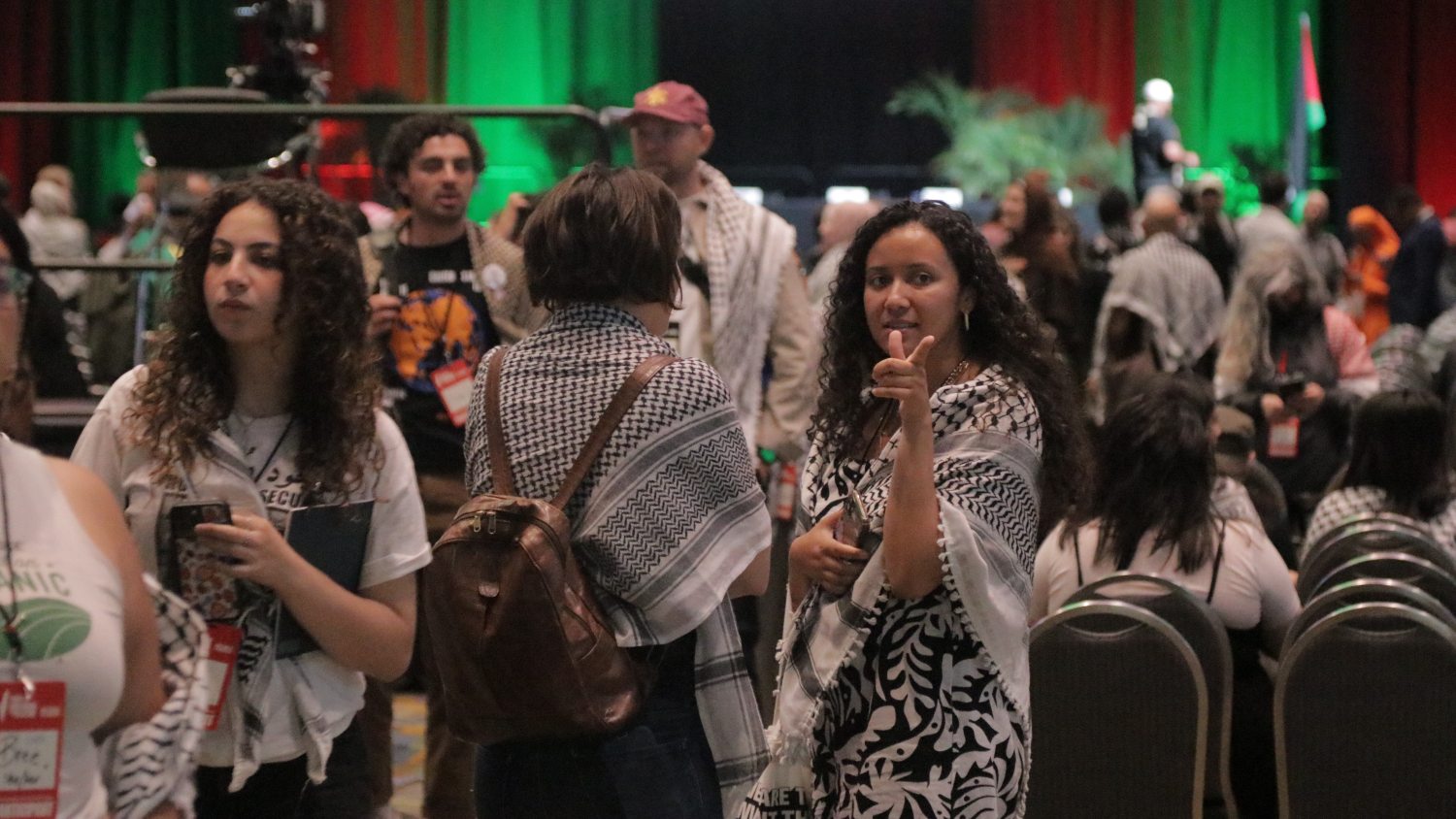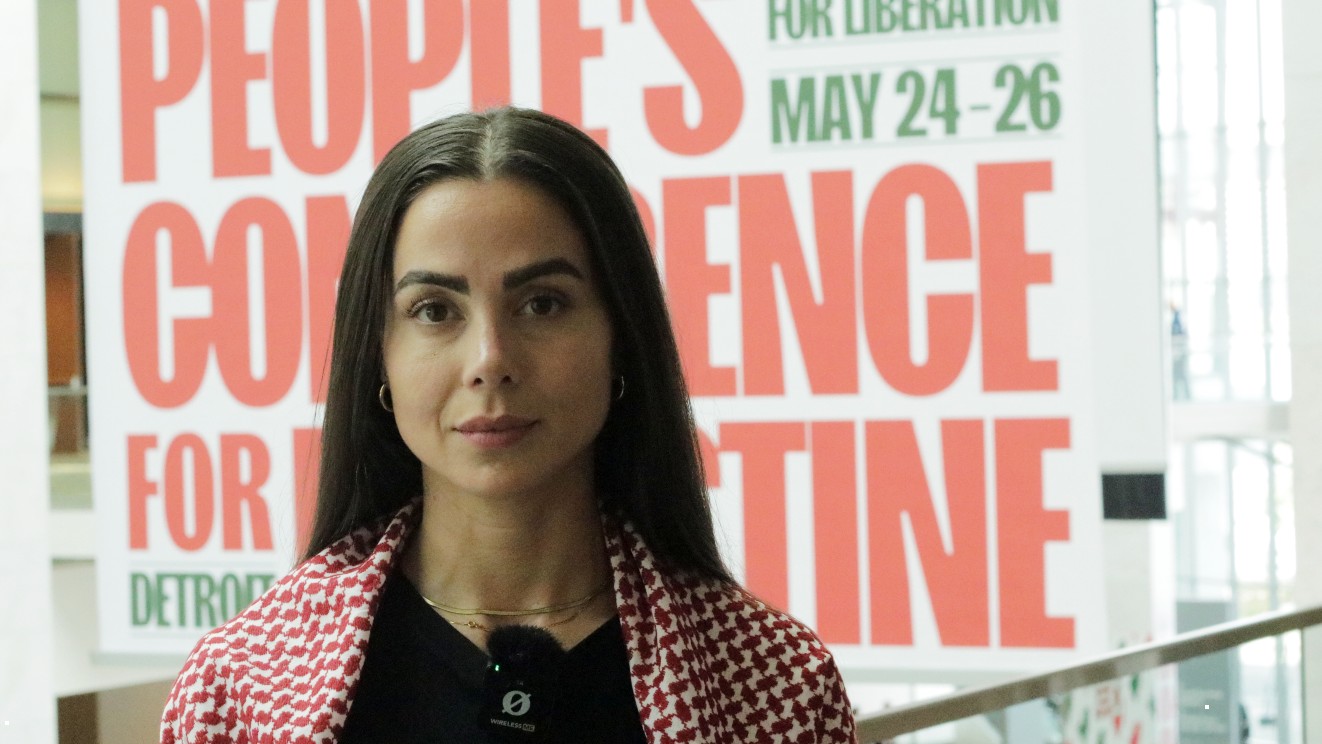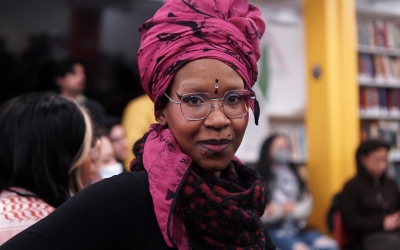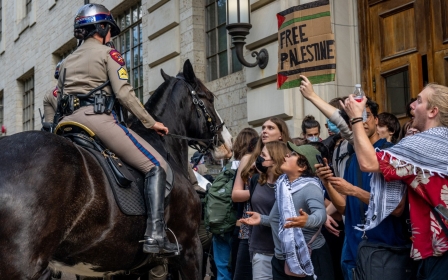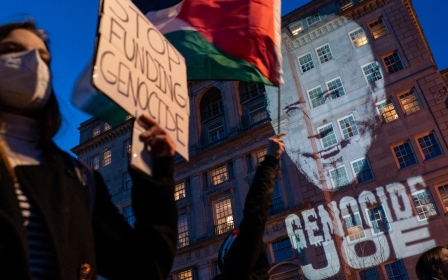'Loss and revolution': Thousands convene in Detroit to plan the future of a free Palestine
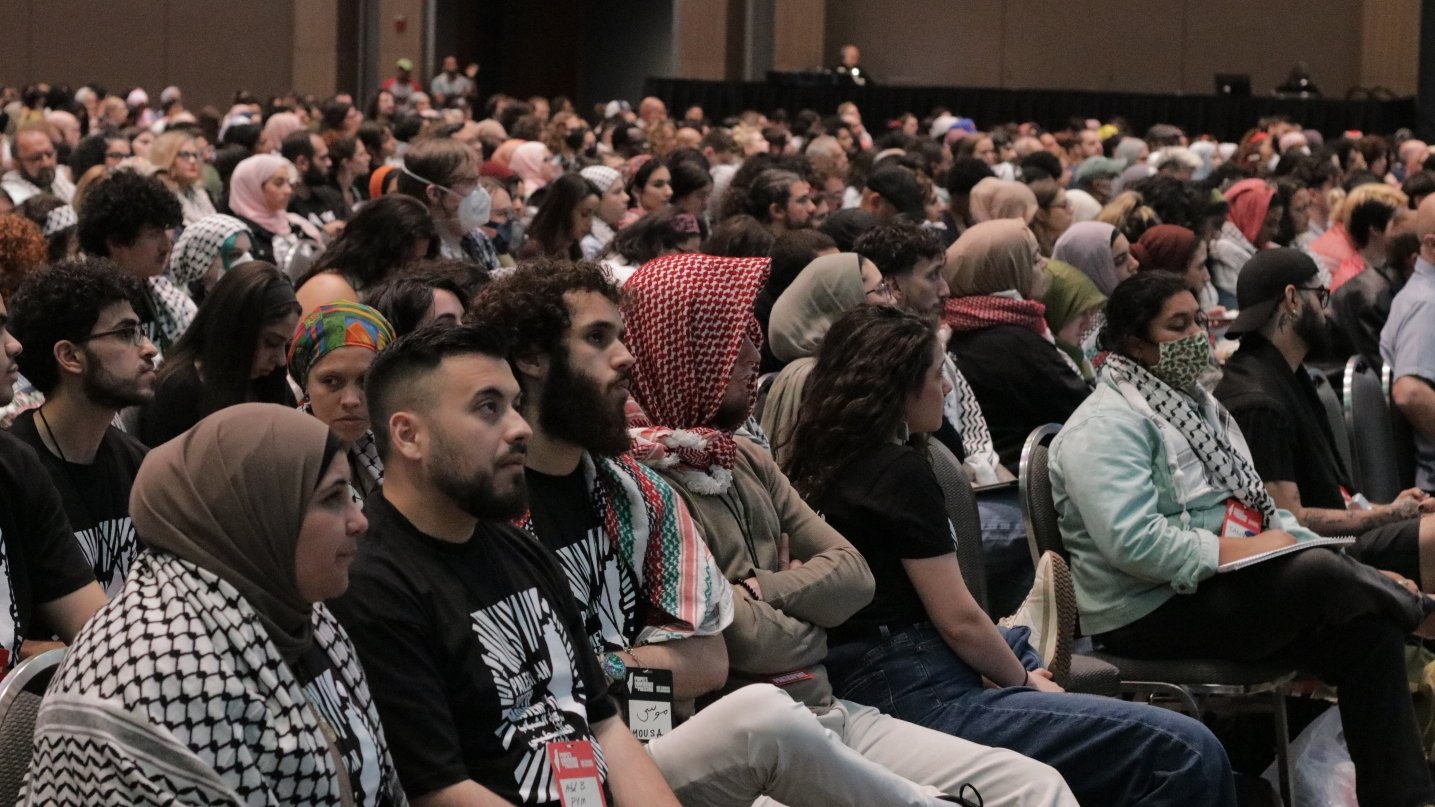
Thousands of pro-Palestinian activists gathered in the US city of Detroit over the weekend to coordinate the next steps in their long-term campaign to end Israel's war on Gaza and also create a future for a free Palestinian people.
More than 3,100 people registered for the three-day 'People's Conference for Palestine' to capitalise on a growing surge in public consciousness around the issue of Palestine and Israel's treatment of the Palestinian people.
Hundreds of attendees could be seen draped in the Palestinian keffiyeh, a headscarf that has come to symbolise Palestinian resistance against colonialism and Israeli occupation, whilst sound levels in some of the conference halls hovered between 80 to 90 decibels - equivalent to the usage of a food blender or a lawnmower.
"Our people have often used conferences as a way to convene, and strategise and for moments of revolution," said Yara Shoufani, an organiser with the Palestinian Youth Movement (PYM), one of the main organisers of the conference.
"And this moment felt particularly important for us to do that, especially since we have been mobilising as a movement nonstop for the last eight months to try to end the genocide against our people."
New MEE newsletter: Jerusalem Dispatch
Sign up to get the latest insights and analysis on Israel-Palestine, alongside Turkey Unpacked and other MEE newsletters
The conference brought together people from different walks of life, from activists, students and teachers; to labour unionists and healthcare workers.
It provided a series of sessions from discussing how to confront Zionism in the workplace to how the media outlets push narratives that justify war to what the landscape for learning about Palestine is in the American educational system.
"People are hungry for strategy. People are hungry for unity. Even though they've been working so hard for the past seven, eight months, they want to build something that's sustainable beyond this moment," PYM member Nashwa Bawab told Middle East Eye.
Beyond knowledge-building
Given the conference's attendance was a mix of seasoned activists to those who have become involved since the beginning of the war on Gaza, many of the main sessions were educational in nature.
The conference was supposed to host a wide range of Palestinian speakers, from Mustafa Barghouti to journalist Wael Dahdouh, but ultimately visa issues forced them to speak virtually rather than in person.
Follow Middle East Eye's live coverage for the latest on the Israel-Palestine war
In between the organised sessions, groups of people who had only ever interacted through the encrypted messaging service Signal were now meeting for the first time and discussing how they could work together on protests and targeted boycotts.
"Organisationally and personally, we're really just here to connect with people," Harry, a member of the group Writers Against the War on Gaza (Wawog) and who asked to be referred to by first name only, told MEE.
"There's a lot of wonderful critical education going on at this conference, great panels and talks. But I think the biggest benefit of bringing everyone together like this is that we can make connections that are much harder to make online."
Ultimately, Harry and other activists wanted to use their time at the conference to "build the foundation for a sustainable long-term movement".
"I have certainly wept. I have felt fortified. I have felt inspired. I feel - even as someone who's been in this movement for two decades now - like things have become clarified even through the first couple of plenaries," Sara Kershner, a founder of the International Jewish Anti-Zionist Network, told MEE.
Getting a geographically diverse group of attendees was one of the reasons for hosting the conference in Detroit, a city that sits near the centre of the US while also bordering Canada. It also happens to be minutes away from Dearborn, the city known as the capital of Arab America.
Turning knowledge-building into direct action was on display over the weekend, when attendees finished the day of plenaries on Friday and went over to assist the Gaza student solidarity encampment recently set up at the nearby Wayne State University, which, like other universities, is demanding the school divest from companies profiting off the war on Gaza.
"The solidarity that we have had from community members is overwhelming. We appreciate that students, alumni, faculty, staff and community members showed up together to support our divestment movement," Zaynah Jadallah, an alumnus of Wayne State, told MEE at the student encampment on Friday night.
The 'terror' conference
The days leading up to the conference saw the usual barrage of attacks from right-wing and pro-Israeli media outlets that occur when conferences discussing Palestine take place in the US.
News sites like the Free Beacon and Jerusalem Post published articles labelling it a "terror" conference. On Friday afternoon, Detroit police were at the scene and patrolling the area.
In this vein, the attacks on the conference resembled another gathering of Palestinians - the Palestine Writes Literature Festival that took place last September. That festival also received a flurry of 11th-hour attacks, but was able to continue without any interruptions.
However, as the war in Gaza has unfolded over the past eight months, stark change has occurred in the realm of pro-Palestine organising.
Terms that have for decades been relegated and denigrated by pro-Israel groups and mainstream media outlets, who linked them to terrorism, are now being pushed to the forefront of mass mobilisations all over the US and Canada.
Words like resistance, martyrdom, jihad and intifada are now being regularly used by protesters, including most notably at the protests on college campuses, which have been dubbed the "Student Intifada", a reference to the Palestinian popular uprisings against Israeli occupation.
The city of Dearborn itself has been a major centre within the United States for pro-Palestine mobilisation, and has also seen major attacks from major news outlets that have labelled the city as a "capital of jihad".
"In this moment, with all the advances we're making, we're also facing unprecedented levels of state repression," Lara Kiswani, executive director of the Arab Resource and Organizing Center in San Francisco, told MEE.
"We're being labelled, mischaracterised, we're being smeared both in the media but also within the halls of power. Words and language and frameworks that we use and should be proud to use are literally being criminalised," added Kiswani, who also attended the conference in Detroit.
While the threat of being surveilled and entrapped by the US government remains high, activists have expressed that they no longer will self-censor or allow others to dictate and define the language they speak.
"We refuse at this point, to play this kind of language game of having to censor ourselves, but rather affirm the traditions and legacies of the Palestinian revolution," Shoufani said.
All eyes on Gaza
While the energy in the air throughout the conference was palpable, organisers also operated under the dark shadow made by the war on Gaza, where more than 35,000 Palestinians have been killed by Israeli forces, according to the Palestinian health ministry.
Israeli forces have targeted schools, UN shelters, hospitals and places of worship throughout the besieged enclave, and have killed healthcare workers, journalists and aid workers, as well as thousands of women and children.
And while rights groups, legal experts, and several countries have labelled Israel's actions in Gaza as genocide, Israel's military continues to operate unrestricted with the full backing of the US.
Earlier this month, Israeli forces launched an assault on the city of Rafah in southern Gaza, where hundreds of thousands of internally displaced Palestinians have sought refuge, despite repeated calls from the international community against such a military operation.
'Our people in Gaza need for us to be organised, need for us to be strategising together, taking to the streets, occupying highways, occupying universities'
- Yara Shoufani, Palestinian Youth Movement
In recent days, the fighting in northern Gaza has surged, with Hamas fighters claiming several large-scale attacks on Israeli forces, and also claiming to have captured Israeli soldiers, a claim that was quickly refuted by Israel.
The ongoing Israeli military escalations in Gaza, coupled with a deteriorating humanitarian situation, have been highlighted during the conversations taking place at the conference.
"This dual reality of both seeing the mass destruction in Gaza as well as the mass movement here is part of the Palestinian struggle where we have often seen both loss and revolution taking place at the same time," said Shoufani of the PYM.
Shoufani said that the assault on Gaza had awakened many sectors of both the Palestinian diaspora and its allies new and old that getting organised and working together on protest strategies is "our responsibility".
"Our people in Gaza need for us to be organised, need for us to be strategising together, taking to the streets, occupying highways, occupying universities," she said.
What some organisers noticed after interacting with people during the conference is the dedication many attendees have expressed in working towards a grander vision for Palestinian freedom.
"There is so much to fight for, and I think that is grounding everyone here. Even though there's a lot of excitement about being able to connect, I think there's also a certain grim determination," said Harry from Wawog.
"People are here for the long haul, and it's been really amazing to see so many people that all have that same outlook, that are not here to hang out and party, they're here to, you know, free Palestine.
"It's a huge task, but we're gonna do it."
Middle East Eye delivers independent and unrivalled coverage and analysis of the Middle East, North Africa and beyond. To learn more about republishing this content and the associated fees, please fill out this form. More about MEE can be found here.


